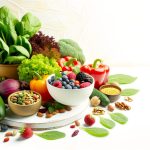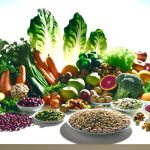Most individuals should be able to get their required daily allowance of vitamins if they maintain a balanced and wide-ranging dietary regimen. If you have worries about nutrients that you may not be getting enough of, or you are thinking about taking nutritional supplements, it is recommended to talk to your doctor or healthcare expert.
How your body absorbs and stores vitamins:
Your body takes in and preserves vitamins in two different methods, depending on their solubility – a lot dissolve in water and are identified as water-soluble, while the remaining dissolve better in the existence of a tiny bit of oil or fat and are referred to as fat-soluble.
Water soluble vitamins. The body does not store most of the vitamins for an extended period, excluding B12, and they are expelled by the kidneys. Therefore, it is essential to continue replenishing your supply.
Fat soluble vitamins. The fat from food is taken into the body through the intestinal tract and circulated through the bloodstream before being kept in the liver.
Water Soluble Vitamins
Thiamin (vitamin B1)
Thiamin, also known as vitamin B1, helps:
- the body break down and release energy from food
- keep the nervous system healthy
Good sources of thiamin
Thiamin is found in many types of food.
Good sources include:
- peas
- some fresh fruits (such as bananas and oranges)
- nuts
- wholegrain breads
- some fortified breakfast cereals
- liver
How much thiamin do I need?
The amount of thiamin adults (aged 19 to 64) need is:
- 1mg a day for men
- 0.8mg a day for women
Your daily diet should provide sufficient amounts of thiamin. The body cannot retain Thiamin, so consuming it as part of your daily diet is essential.
What happens if I take too much thiamin?
It is unclear what the consequences could be of consuming large amounts of thiamin supplements on a daily basis due to the lack of available proof. It is possible to get the necessary amount of thiamin by consuming a balanced and varied diet.
You should not overdo it if you are using nutritional supplements, as it can be dangerous. Consuming 100mg or less of thiamin supplementation per day is probably not hazardous.
Riboflavin (vitamin B2)
Riboflavin, also known as vitamin B2, helps:
- keep skin, eyes and the nervous system healthy
- the body release energy from food
Good sources of riboflavin
Good sources of riboflavin include:
- milk
- eggs
- fortified breakfast cereals
- mushrooms
- plain yoghurt
Ideally, foods containing riboflavin should not be exposed to ultraviolet light due to the fact that it can damage the nutrient.
How much riboflavin do I need?
The amount of riboflavin adults (aged 19 to 64) need is about:
- 1.3mg a day for men
- 1.1mg a day for women
It is possible to obtain sufficient riboflavin from regular meals.
Your body is unable to store Riboflavin, thus necessitating you to incorporate it into your daily diet.
What happens if I take too much riboflavin?
It is impossible to predict the results of taking large amounts of riboflavin supplements every day as there is not enough information available. A balanced and nutritious diet should be enough to provide you with your necessary daily intake of riboflavin.
Consuming no more than 40mg of riboflavin supplements each day is unlikely to result in any adverse effects.
Niacin (Vitamin B3)
Niacin, also known as vitamin B3, helps:
- the body release energy from food
- keep the nervous system and skin healthy
READ MORE: Niacin Vitamin B3: What does it do?
Good sources of niacin
Two variants of niacin exist: nicotinic acid and nicotinamide. Both are found in food.
Good sources of niacin include:
- meat
- fish
- wheat flour
- eggs
How much niacin do I need?
The amount of niacin you need is about:
- 16.5mg a day for men
- 13.2mg a day for women
It is possible to obtain all the necessary niacin from your regular meals.
The body is unable to retain Niacin, making it essential to consume it on a daily basis.
What happens if I take too much niacin?
Ingesting large amounts of niacin pills can lead to facial blushing. Using large amounts of (the drug/substance) over an extended period could potentially damage the liver.
No data exists to determine what the ramifications could be of taking high amounts of nicotinamide tablets each day.
It is possible to consume enough niacin to satisfy your body’s needs by eating a diversified and balanced selection of foods.
Pantothenic Acid
Pantothenic acid plays a role in aiding the body to extract energy from foods consumed.
Good sources of pantothenic acid
Pantothenic acid is found in varying amounts in almost all vegetables, wholegrain foods and meats, but good sources include:
- chicken
- beef
- liver and kidneys
- eggs
- mushrooms
- avocado
Cereals that have been fortified with pantothenic acid make a great breakfast.
How much pantothenic acid do I need?
A specific quantity of pantothenic acid required has not been determined in the United Kingdom.
It is possible to get the necessary amount of pantothenic acid from what you eat on a daily basis since it is present in a variety of food items.
You must consume pantothenic acid daily since the body cannot store it.
What happens if I take too much pantothenic acid?
We do not have enough proof to figure out what could be the consequences of ingesting substantial quantities of pantothenic acid supplements on a daily basis. You can meet your daily needs for pantothenic acid by having an eating pattern that consists of a variety of healthy foods.
Beware of taking large amounts of supplements, as it could have damaging effects.
Vitamin B6
Vitamin B6, also known as pyridoxine, helps:
- the body to use and store energy from protein and carbohydrates in food
- the body form haemoglobin, the substance in red blood cells that carries oxygen around the body
Vitamin B6 is an incredibly versatile nutrient that is involved in more bodily functions than any other. This enzyme mainly works as a cofactor, creating red blood cells, enabling cells to generate proteins, producing neurotransmitters in the brain and disbursing energy. Research indicates that it could be beneficial in protecting against, and treating, many health issues.
Good sources of vitamin B6
Vitamin B6 is found in a wide variety of foods, including:
- pork
- poultry, such as chicken or turkey
- some fish
- peanuts
- soya beans
- wheatgerm
- oats
- bananas
- milk
- some fortified breakfast cereals
Having a bowl of fortified cereal with a banana and a hefty salmon steak would give you all the nutrients you need for the day. The prime sources of iron are chicken, lean cuts of beef, egg yolks, garbanzos, fatty fishes, dairy, Brussels sprouts, scallions, bananas and wheat germ. An adult requires an average of 1.4mg of something every day, with greater quantities necessary during pregnancy and during breastfeeding.
How much vitamin B6 do I need?
The amount of vitamin B6 adults (aged 19 to 64) need is about:
- 1.4mg a day for men
- 1.2mg a day for women
It is advisable to obtain all the essential Vitamin B6 from regular consumption of food.
The microorganisms that exist naturally in your digestive system are capable of producing vitamin B6.
What happens if I take too much vitamin B6?
It is important to be mindful of your dosage when consuming a dietary supplement. Excessive amounts can be harmful.
Consuming 200mg or more per day of vitamin B6 can result in peripheral neuropathy, a condition involving numbness and tingling sensations in one’s arms and legs. In most cases, your condition should get better once you discontinue using the supplements.
In some circumstances, when individuals consume a great deal of vitamin B6 over a prolonged period of time, the outcome can be everlasting.
It is uncertain what result occurs from taking vitamin B6 in doses between 10 and 200 mg. It is not clear how long people can use these doses without potential harm.
A well-rounded and balanced dietary intake should provide sufficient vitamin B6. Do not exceed the recommended dosage of Vitamin B6, as this could be damaging to your health. You should not consume more than 10 milligrams of vitamin B6 daily via supplement form, unless a medical professional has told you to do so.
Biotin (Vitamin B7)
Biotin, sometimes referred to as vitamin H, is an important element in maintaining healthy skin, hair, nails and providing energy.
How can I get it?
Brewer’s yeast, animal liver, soybeans, brown rice, nuts, egg yolks, and produce are all sources of this nutrient. The beneficial bacteria located in your internal organs also produce biotin, so the amount of biotin you require through your diet relies on your intestinal health.
Folate (Folic Acid)
Vitamin B9, also called folate, is particularly important for pregnant women as it guards against neural defects. Additionally, it is associated with keeping the immune system in check, producing energy, and preventing anaemia. Folic acid is the artificial form of folate.
How can I get it?
Adults need 200mcg (micrograms) of folate each day. One 80 gram portion of Brussels sprouts provides 88 micrograms, while 30 grams of fortified breakfast cereal furnishes 119 micrograms of the nutrient. A 150 milliliter glass of freshly squeezed orange juice gives you 33 micrograms, and one slice of toasted whole wheat bread gives you 15 micrograms.
Other beneficial foods to eat include dark green leafy produce like kale, spinach, asparagus, broccoli, sprouts, egg yolks, carrots, apricots, oranges, pumpkins, gourds, melons, and grains like whole-wheat and rye.
Vitamin B12
Vitamin B12 is essential for growth, the digestive and nervous systems to operate correctly, generating energy and manufacturing healthy red blood cells. Once you hit 50 years old, your body becomes less successful at taking in vitamin B12 from food.
How can I get it?
A significant glass of milk, one egg, or a portion of fortified cereal can provide your body with the nutrients it needs on a daily basis. B12 is primarily found in animal-based products like beef, liver, pork, shellfish, fish, eggs, and dairy. Non-meat eaters should think about eating fortified food items, as well as foods from the ocean such as sea vegetables and spirulina. It is possible to get the daily requirement of 1.5mcg of vitamin B12 through a healthy and varied diet.
Vitamin C
Vitamin C can aid the body’s immune system, promote cardiovascular health, improve skin and gum health, and help ward off illnesses such as cardiovascular disease and cancer.
How can I get it?
You can fulfill your daily nutritional requirements by eating an orange, half a red pepper or a generous helping of watercress. Fruits such as berries, pomegranates, and citrus varieties are fine options, as are potatoes, pumpkins, cabbage, broccoli, cauliflower, and spinach.
We need approximately 40mg of vitamin C per day.
Fat Soluble Vitamins
Vitamin A
Vitamin A, otherwise labeled as retinol, is a nutrient that is able to dissolve in fatty substances. It is vital for advancing and cell formation, sight and invulnerable framework, just as for full, energetic skin and hair and for supporting the honesty of the digestive tract coating. This provides immunity to illnesses and has strong anti-oxidizing properties which shield the body against developing ailments.
How can I get it?
We can acquire pre-made vitamin A from sources such as meat, eggs, and dairy products, whereas beta-carotene can be found in fruit and vegetables, which our bodies are capable of converting into vitamin A. A single 180g baked sweet potato could fulfill your daily requirements. Alternative sources of Vitamin A include animal-based foods like liver, fish with oil, eggs, milk, cheeses, and butter. Vegetables such as broccoli, dark greens, red peppers, squash, mangoes, honeydews, and apricots are also beneficial sources.
A male ought to get 0.7 milligrams each day and a female should be getting 0.6 milligrams. Your body will save any unused vitamin A, so there is no need to get a new dose every day.
Vitamin D
Vitamin D, identified as the “sunshine vitamin,” is essential in controlling the levels of calcium and phosphorous in the body. This helps to maintain strong bones and may help in controlling the advancement of osteoporosis.
It is thought that Vitamin D works with Vitamins A and C to aid the immune system, and it could potentially reduce the risk of certain types of cancers.
ZinC-ADE by Purium is our “first line of defense” product to support your immunity! ZinC-ADE delivers specific, targeted, plant-sourced nutrients (Zinc and Vitamins A, C, D & E) to support a healthy terrain throughout the body while keeping with Purium’s pure, whole-food approach to immune support.
Our muscles require vitamin D in order to develop and to operate as they should.
How can I get it?
The skin predominantly produces Vitamin D when exposed to sunlight. It is advised to take 15 to 30 minutes to be exposed to the sun (depending on your age and racial background) between late March and early September, to get your daily dose of Vitamin D. A single can (155g) of sardines will fulfill your daily requirements. Try to include herrings, salmon, tuna, dairy products, mushrooms, and eggs into your eating routine regularly.
The public sector recommends that adults, expecting and nursing mothers, as well as babies over one year of age, need to obtain 10 micrograms of Vitamin D daily.
During the summer season, people can get enough Vitamin D through the sun’s rays, but the Department of Health suggests people in certain groups take supplements, particularly from fall to winter.
Vitamin E
Vitamin E possesses properties that ward off damage, boost antioxidant activity, and keep your skin healthy, immune system performing properly, and heart strong.
How can I get it?
You could eat either half a sizeable avocado or a small portion of sunflower seeds to meet your daily nutritional requirements. Vitamin E is present in various foods, notably vegetable oils such as sunflower and pumpkin, seafood like tuna and salmon, cruciferous vegetables like broccoli, nuts like almonds, eggs, soy items, as well as wholegrain materials like oats, rye, and brown rice.
The daily requirement of vitamin E for males is 4mg while females should aim for 3mg of the nutrient, both of which can be obtained from eating a healthy and balanced diet.









